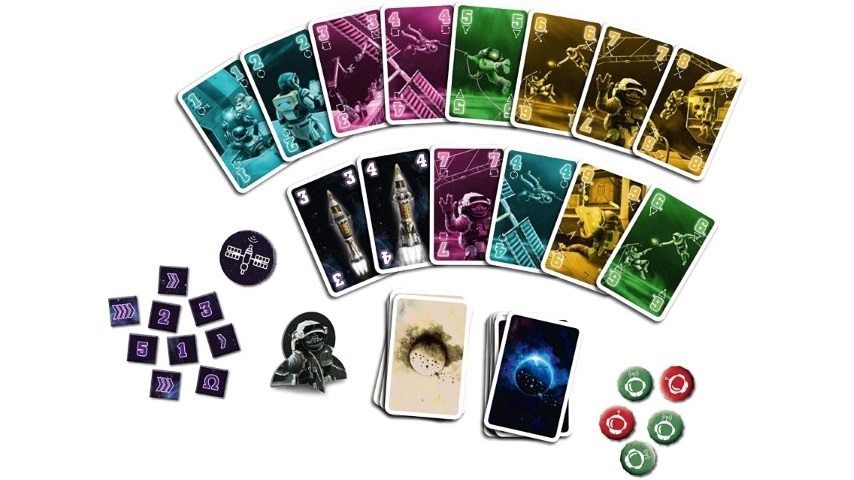The Crew: The Quest for Planet Nine Is a Fun Game, But Its Kennerspiel des Jahres Nomination Is Tricky
Games Reviews board games
The Crew: The Quest for Planet Nine is one of the three nominees for this year’s Kennerspiel des Jahres (expert’s game of the year) award, but it’s actually a pretty simple game to learn. It’s like euchre meets The Mind, a trick-taking, cooperative game where the rounds get harder as you progress through it, and you’re very limited in how much you can communicate with your teammates. It’s beautifully frustrating, and definitely fun, but I am a bit perplexed by its nomination all the same.
The Crew requires three to five players—there’s a two-player variant I haven’t tried that seems very involved—and plays with a deck of forty cards, 1 through 9 in four suits plus four “rocket” cards numbered 1 through 4. The tricks play as you’d expect: someone leads, you have to follow suit if you can, with the rocket cards as permanent trumps.
Since it’s a cooperative game, however, you’re not trying to win the most tricks. Each time you play, you’re trying to complete a ‘mission,’ 50 in total, increasing in complexity as the game goes on. There’s a second deck of 36 smaller ‘task’ cards, mirroring the non-rocket cards from the main deck. In the earliest games, you’ll deal out one or more cards from that deck, and players will go around the table selecting one of these task cards at a time until they’re all taken. In the first game, there’s just one task card, and it goes to the commander (whoever was dealt the rocket 4 card). The commander has to win a trick containing that card for the team to complete that mission. The second mission has two task cards. The third has two task cards, but they must be completed in a specific order. Later missions might include playing the entire deck while ensuring that one player wins zero tricks; requiring that a certain card be won with the last trick of the game; or mandating that a 1-card must win a trick (meaning all the other cards played must be from other suits).

The catch is that you can barely communicate with your teammates. You can’t talk about your cards, except via a single communication token given to each player at the start of every mission. You can use this token with one card from your hand, and can place the token to indicate that the card is your highest, lowest, or only card in that suit. You can only use it once per mission—and some missions prohibit you from using it until you’ve completed some number of tricks—after which you flip your communication token to its red side and set it aside for the rest of the game. (You still play that card as you would anything from your hand.) The more difficult the mission, the more you’ll have to consider when to use that one communication token, if you can use it at all.
Completing tricks is trickier—pun intended—than it might seem at first, because you often have to win a card that’s got a low value, which means working through your hands to get rid of one or more suits so you can get the right cards to the right people. I personally found this kind of hilarious, despite the fact that it was often difficult—it took us four tries just to win the two-tasks mission, although we then won the subsequent mission, winning two tasks in a specific order, on the first try. (This was with three people.) As with The Mind, playing over and over with the same team makes you learn everyone’s styles and rhythms, so you can get better at it even as the missions get more challenging. It’s also a rather ideal game for self-isolation, since it actively rewards repeat play.
While I think The Crew is quite solid, I am totally flummoxed about its nomination in the Kennerspiel category, because it’s so simple. If you’ve played euchre, bridge, or even more modern trick-taking games like Fox in the Forest or Claim, you know The Crew’s main mechanic. Figuring out how to get certain players to win specific cards is the twist, but it’s not very complicated, while the lack of communication is too similar to The Mind (itself a Spiel des Jahres nominee in 2018). I do recommend this game, but it’s definitely not a complex or “expert’s” game; and while it’s not novel in any way, if anything it benefits from how familiar its different parts are.
Keith Law is the author of Smart Baseball and a senior baseball writer for The Athletic. His latest book, The Inside Game, is due out in April 2020. You can find his personal blog the dish, covering games, literature, and more, at meadowparty.com/blog.